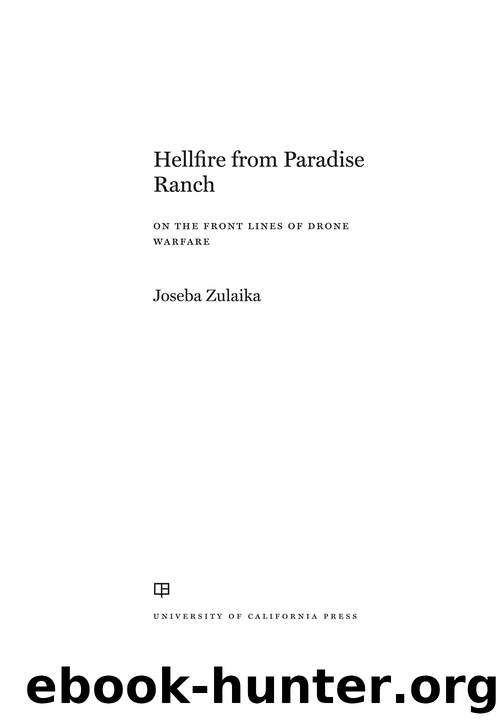Hellfire from Paradise Ranch by Joseba Zulaika

Author:Joseba Zulaika
Language: eng
Format: epub
ISBN: 9780520329744
Publisher: University of California Press
A MODEST PROPOSAL FOR COLD WARRIORS
In the spring of 1961, President Kennedy addressed the Joint Chiefs of Staff with a simple question: âIf your plans for general [nuclear] war are carried out as planned, how many people will be killed in the Soviet Union and China?â163 Their answer: between 275 million and 325 million. What about the totality of global death? Answer: roughly 600 million deaths.
It was a number not for the faint-hearted. But they were men of the Greatest Generation planning the Greatest War ever, tough cold warriors willing to ride the horses of the Apocalypse while facing the modest proposal of absorbing 600 million deaths.
As Defense Secretary McNamara concluded in 1965 the Vietnam War to be unwinnable, General William Westmoreland issued a report with an arresting idea: âShort of a decision to introduce nuclear weapons against sources and channels of enemy power, I see no likelihood of achieving a quick, favorable end to war.â164 Westmoreland had constantly been requesting more troops, but they were never enough. The potential of a recourse to atomic weapons was, in fact, present throughout the war, beginning with McNamaraâs signals during the escalation of 1965 and his reference to President Eisenhowerâs statement that the armistice in Korea was obtained by bringing up the prospect of nuclear attack, suggesting the same for Vietnam.165 During the Nixon administration, both Nixon and Henry Kissinger frequently mentioned the option of nuclear weapons to end the war. According to the North Vietnamese leader Le Duan, the US had threatened to use nuclear weapons on thirteen different occasions.166
McNamara later had a change of thinking regarding his own conduct during the Vietnam War and his support for nuclear weapons. At the end of the documentary The Fog of War, having admitted that âreason has limitsâ and that the nuclear holocaust had been avoided by sheer luck, a sobbing McNamara quotes T.âS. Eliot: âWe shall not cease from exploration, and the end of all our exploring will be to arrive where we started and know the place for the first timeââthe place where the antinuclear objectors had been from day one.167 He concludes his autobiography by quoting Sakharov: âReducing the risk of annihilating humanity in a nuclear war carries an absolute priority over all other considerations.â168
McNamara was echoing what George Kennan had long been advocating after his own change of mind. No other figure articulated more insightfully the thinking, fears, contradictions, and retractions of the Cold War than diplomat and historian Kennan. He is universally known as the man who provided the theoretical basis for the strategy of âcontainmentâ of Soviet expansion, and yet he was also the one who later would most abhor the militarized interpretation given to his thinking. Kennan mercilessly attacked the âfantasy worldâ of the armament race: âIt has no foundation in real interestsâno foundation, in fact, but in fear, and in an essentially irrational fear at that. It is carried not by any reason to believe that the other side would, but only by a hypnotic fascination with the fact that it could.
Download
This site does not store any files on its server. We only index and link to content provided by other sites. Please contact the content providers to delete copyright contents if any and email us, we'll remove relevant links or contents immediately.
| Arms Control | Diplomacy |
| Security | Trades & Tariffs |
| Treaties | African |
| Asian | Australian & Oceanian |
| Canadian | Caribbean & Latin American |
| European | Middle Eastern |
| Russian & Former Soviet Union |
The Secret History by Donna Tartt(19007)
The Social Justice Warrior Handbook by Lisa De Pasquale(12178)
Thirteen Reasons Why by Jay Asher(8877)
This Is How You Lose Her by Junot Diaz(6862)
Weapons of Math Destruction by Cathy O'Neil(6252)
Zero to One by Peter Thiel(5772)
Beartown by Fredrik Backman(5719)
The Myth of the Strong Leader by Archie Brown(5484)
The Fire Next Time by James Baldwin(5417)
How Democracies Die by Steven Levitsky & Daniel Ziblatt(5205)
Promise Me, Dad by Joe Biden(5132)
Stone's Rules by Roger Stone(5068)
A Higher Loyalty: Truth, Lies, and Leadership by James Comey(4942)
100 Deadly Skills by Clint Emerson(4902)
Rise and Kill First by Ronen Bergman(4766)
Secrecy World by Jake Bernstein(4732)
The David Icke Guide to the Global Conspiracy (and how to end it) by David Icke(4689)
The Farm by Tom Rob Smith(4490)
The Doomsday Machine by Daniel Ellsberg(4476)
